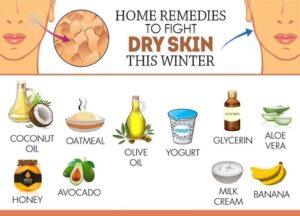Dry skin can be bothersome and uncomfortable, especially during colder months or in arid climates. It can cause itching, flaking, and even cracking, making it essential to address it promptly. While many commercial products are available for treating dry skin, several effective home remedies can provide relief and hydration. Here’s a guide on how to treat dry skin effectively at home:
- Hydrate Inside and Out:
Sip on lots of water throughout the day to keep your body hydrated from the inside out.
Use a humidifier in your home, especially during the winter, when indoor heating can contribute to dry air. Humidifiers add moisture to the air, which can help prevent your skin from becoming too dry.
- Use Gentle Cleansers:
Opt for mild, fragrance-free cleansers that won’t strip away the natural oils from your skin. On the labels, look for words like “gentle” or “hydrating.”
Avoid hot showers and baths, as hot water can further dry your skin. Instead, use lukewarm water and limit your time in the shower or bath to no more than 10 minutes.

- Moisturize Regularly:
Apply a rich, emollient moisturizer for dry skin immediately after bathing or showering while your skin is still damp. This helps lock in moisture and prevents dryness.
Look for moisturizers that contain ingredients like hyaluronic acid, glycerin, shea butter, or ceramides, which help hydrate and repair the skin’s barrier.
- Use Natural Oils:
Natural oils such as coconut, almond, and jojoba oil can be excellent moisturizers for skin. Apply a few drops of oil to damp skin after showering or bathing to help seal in moisture.
Olive oil can also be used as a natural moisturizer for dry skin. Before going to bed, give your skin a little massage.
- Exfoliate Gently:
Exfoliating can help remove dead skin cells and promote cell turnover, but it’s essential to do so gently, especially if you have dry skin.
Choose a gentle exfoliating scrub or use ingredients like sugar, honey, or oatmeal. Limit exfoliation to once or twice a week to avoid irritating your skin.
- Use Oatmeal Baths:
Oatmeal is known for its soothing properties and can help relieve dry, itchy skin. Add colloidal oatmeal (finely ground oats) to your bathwater and soak for 15-20 minutes to soothe dryness and irritation.
Alternatively, you can make a paste with oatmeal and water and apply it directly to dry patches of skin for quick relief.
- Stay Sun Protected:
Even in cooler months, the sun’s UV rays can still damage your skin and contribute to dryness. Apply a broad-spectrum sunscreen for dry skin with SPF 30 or higher before going outside, especially on exposed areas like your face, neck, and hands.
- Pay Attention to Your Diet:
Eating a balanced diet rich in fruits, vegetables, and healthy fats can help improve the overall health of your skin.
Foods high in omega-3 fatty acids, such as salmon, walnuts, and flaxseeds, can help keep your skin hydrated and supple.
- Limit Irritants:
Avoid harsh soaps, detergents, and skincare products containing alcohol or fragrances, as these can further irritate and dry out your skin.
Wear gloves when washing dishes to protect your hands from exposure to harsh chemicals and hot water.
- Seek Professional Help if Needed:
Consider consulting a dermatologist if home remedies don’t provide relief or if your skin is severe and persistent. They can help identify underlying causes and recommend appropriate treatments, such as prescription creams or medications.
In conclusion, treating skin effectively at home requires a combination of hydration, gentle skincare practices, and nourishing ingredients. Following these tips and making simple lifestyle changes can keep your skin hydrated, healthy, and comfortable year-round. Remember to be consistent with your skincare routine and listen to your skin’s needs for the best results.